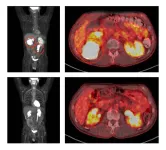(Press-News.org) In October 2018, Canada enacted the Cannabis Act in Canada (CAC), which legalised the non-medical use of cannabis. A new study has found that the rate of cannabis-related disorders diagnosed among pregnant women in the Canadian province of Québec increased by more than 20% after the enactment of the CAC, while rates for all other drug- and alcohol-related disorders remained stable. The study is published today in the scientific journal Addiction.
This study measured changes to the monthly rates of diagnosed cannabis-related disorders (CRDs) in the pregnant population in Québec. Since 2010 the monthly average number of CRDs has increased consistently, and before October 2018, the average number of CRD diagnoses per month was 14.5 per 100,000 pregnant women. After October 2018, the average number of CRD diagnoses per month jumped to 23.5 per 100,000 pregnant women and has remained at that higher level. There were no significant changes for any other drug- and alcohol-related disorders in the same period.
The study looked at rates of CRD diagnoses in pregnant women aged 15 to 49 years in the Canadian province of Québec between January 2010 and July 2021. Data were sourced from the Québec Integrated Chronic Disease Surveillance System (QICDSS). Given that approximately 98% of the Québec population is eligible and admissible to public health insurance, the QICDSS encompasses data for nearly the entire population of the province.
Lead author Professor José Ignacio Nazif-Munoz, of the Université de Sherbrooke, says: “Cannabis use during pregnancy has been associated with elevated risk of preterm birth, neonatal intensive care unit admissions, low birth weight, and other negative outcomes, so the increase in CRD diagnoses after the Cannabis Act should trigger a robust public health response. Our study highlights the importance of universal screening for CRDs. Additionally, pregnant women with a history of cannabis disorder may benefit from repeated screening and ad-hoc counselling during pregnancy.”
-- Ends –
For editors:
This Open Access paper is available online (https://onlinelibrary.wiley.com/doi/10.1111/add.16564) or you may request a copy from Jean O’Reilly, Editorial Manager, Addiction, jean@addictionjournal.org.
To speak with lead author Prof. José Ignacio Nazif-Munoz, please contact him at the Université de Sherbrooke by telephone (+1 438 502 5210) or email (nazj1501@usherbrooke.ca).
Full citation for article: Nazif-Munoz JI, Martínez P, Huỳnh C, Massamba V, Zefania I, Rochette L, and Vasiliadis H-M. Changes in prenatal cannabis-related diagnosed disorders after the Cannabis Act and the COVID-19 pandemic in Quebec, Canada. Addiction. 2024. https://doi.org/10.1111/add.16564
Primary funding: This study was funded by Fonds de recherche Societé et Cultures (project number 322560). Pablo Martínez acknowledges the Fons de Recherche du Québec sur la Nature et les Technologies (FRQNT-PBEEE) postdoctoral fellowship. We also received some support from Institut universitaire sur les dépendances. The sponsors had no further role in the study design, data analysis and interpretation, the dating of the manuscript or the decision to submit this article for publication.
Declaration of interests: The authors declared no competing interests.
Addiction (www.addictionjournal.org) is a monthly international scientific journal publishing peer-reviewed research reports on alcohol, substances, tobacco, gambling, editorials, and other debate pieces. Owned by the Society for the Study of Addiction, it has been in continuous publication since 1884.
END
Rate of cannabis use disorder during pregnancy increased over 20% after cannabis legalization in Canada
2024-06-20
ELSE PRESS RELEASES FROM THIS DATE:
Among cancer survivors, LGBTQ+ individuals report higher prevalence of chronic health conditions, disabilities, other limitations
2024-06-20
Bottom Line: Cancer survivors who identify as lesbian, gay, bisexual, transgender, queer, or anything other than straight and cisgender (LGBTQ+) experience more chronic health conditions, disabilities, and other physical and cognitive limitations than non-LGBTQ+ cancer survivors; however, the prevalence of most conditions was highest among transgender or gender non-conforming (TGNC) individuals.
Journal in Which the Study was Published: Cancer Epidemiology, Biomarkers & Prevention, a journal of ...
Improving crops with laser beams and 3D printing
2024-06-20
A demonstration of how new technologies can be used in 21st century crop breeding comes from just published research that combines Laser Scanning and 3D printing to create a detailed 3D model of a sugar beet plant. Taking the next step beyond having genetic information to guide intelligent breeding, the 3D plant models here capture the essential characteristics of the above-ground parts of the sugar beet plant and can be used for AI-assisted crop improvement pipelines. The sugar beet plant models are reproducible and fit for field use. All the research information, data, methodology, as well as the 3D printing files are freely ...
Government’s failure to fortify all flour and rice with sufficient folic acid will lead to avoidable birth defects, warns expert
2024-06-20
The UK government’s failure to fortify all flour and rice with the vitamin folic acid “will result in more deaths and birth defects every year that could have been prevented,” argues Professor Sir Nicholas Wald in The BMJ today.
He warns that the current government’s proposal to fortify only one type of flour (non-wholemeal wheat flour) at an inadequate level will prevent only about 20% of neural tube defects, much less than the approximate 80% that could be prevented with fully effective fortification.
“What the government has done is a useful ...
Walking brings huge benefits for low back pain, study finds
2024-06-20
Adults with a history of low back pain went nearly twice as long without a recurrence of their back pain if they walked regularly, a world-first study has found.
About 800 million people worldwide have low back pain, and it is a leading cause of disability and reduced quality of life.
Repeated episodes of low back pain are also very common, with seven in 10 people who recover from an episode going on to have a recurrence within a year.
Current best practice for back pain management and prevention suggests the combination of ...
Study finds one copy of protective genetic variant helps stave off early-onset Alzheimer’s disease
2024-06-19
KEY TAKEAWAYS
An international team, including researchers from Mass General Brigham, has been searching for protective genetic variants in a family that includes more than 1,000 individuals who are genetically predisposed to develop early onset Alzheimer’s disease in their 40s.
Previously, the researchers identified the “Christchurch variant” as potentially protective against Alzheimer’s based on one family member who had two copies of this variant and was expected to develop dementia in her ...
Combination targeted treatment produces lasting remissions in people with resistant aggressive B-cell lymphoma
2024-06-19
Embargoed for Release
Wednesday, June 19, 2024
5:00 p.m. ET Contact: NCI Press Office
240-760-6600
NCIPressOfficers@nih.gov
NOTE: A virtual briefing is scheduled for Tuesday, June 18, 2024, at 1:00 p.m. ET. Details below.
Researchers at the National Institutes of Health (NIH) have developed a non-chemotherapy treatment regimen that is achieving full remissions for some people with aggressive B-cell lymphoma that has come back or is no longer responding to standard treatments. The five-drug combination targets multiple molecular pathways that diffuse large B-cell lymphoma (DLBCL) tumors use to survive.
In ...
Common prostate drugs tied to lower risk of dementia with lewy bodies
2024-06-19
EMBARGOED FOR RELEASE UNTIL 4 P.M. ET, WEDNESDAY, JUNE 19, 2024
MINNEAPOLIS – Certain drugs used to treat urinary symptoms due to an enlarged prostate may be associated with a reduced risk of dementia with Lewy bodies, according to a study published in the June 19, 2024, online issue of Neurology®, the medical journal of the American Academy of Neurology. Dementia with Lewy bodies is a progressive neurodegenerative disorder that can cause memory and thinking issues, movement problems and issues such as hallucinations.
The results do not prove that these drugs reduce the risk of dementia ...
Drugs for enlarged prostate may also protect against dementia with Lewy bodies
2024-06-19
A new study suggests that certain drugs commonly used to treat enlarged prostate may also decrease the risk for dementia with Lewy bodies (DLB). This observational finding may seem surprising, but it mirrors previous work by the University of Iowa Health Care team that links the drugs to a protective effect in another neurodegenerative condition–Parkinson's disease.
The UI researchers think that a specific side effect of the drugs targets a biological flaw shared by DLB and Parkinson’s disease, as well as other neurodegenerative ...
Titan’s lakes may be shaped by waves
2024-06-19
Titan, Saturn’s largest moon, is the only other planetary body in the solar system that currently hosts active rivers, lakes, and seas. These otherworldly river systems are thought to be filled with liquid methane and ethane that flows into wide lakes and seas, some as large as the Great Lakes on Earth.
The existence of Titan’s large seas and smaller lakes was confirmed in 2007, with images taken by NASA’s Cassini spacecraft. Since then, scientists have pored over those and other images for clues to the moon’s mysterious ...
YALE EMBARGOED NEWS: Family psychiatric history: Effects on siblings of children with autism
2024-06-19
New Haven, Conn. — Children who have an older sibling with autism spectrum disorder (autism) are at greater risk of developmental vulnerabilities if they also have other relatives with neurodevelopmental or psychiatric conditions, according to a new study from the Yale Child Study Center.
Researchers found that the siblings of children with autism had an increase in the severity of social and communication difficulties — which are common in autism — if they had relatives with conditions such as schizophrenia or anxiety. Family histories of anxiety and intellectual disability were also associated ...



